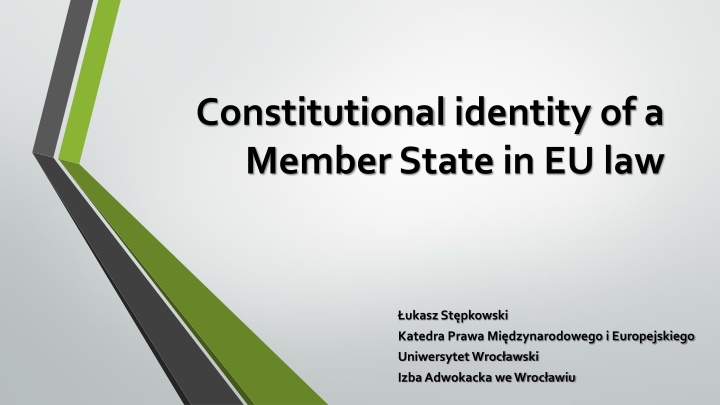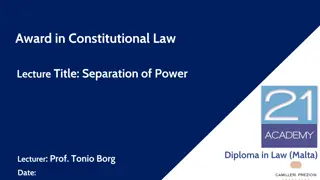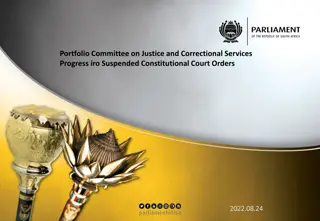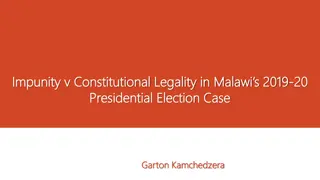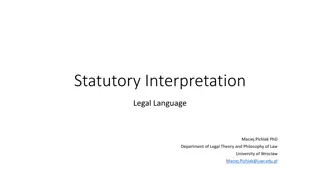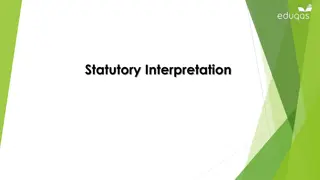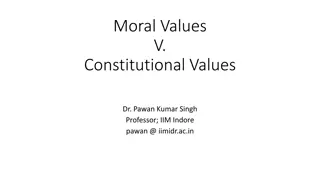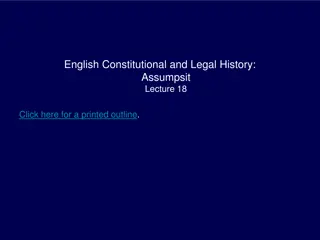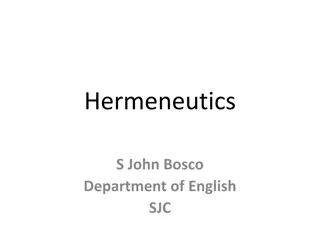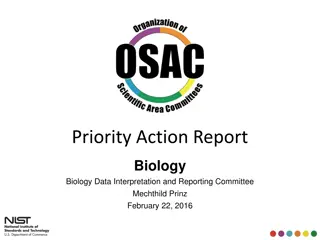Constitutional Identity in EU Law: Evolution and Interpretation
Exploring the concept of constitutional identity within EU law, this article delves into the evolution of this principle from the Treaty of Maastricht to the current Treaty structures. It highlights the notion of respecting national identities and essential state functions, emphasizing the importance of upholding Member States' constitutional identities. The current state of EU law reflects a merger of sovereignty, with debates on the relationship between EU and national legal orders.
Uploaded on Nov 22, 2024 | 0 Views
Download Presentation

Please find below an Image/Link to download the presentation.
The content on the website is provided AS IS for your information and personal use only. It may not be sold, licensed, or shared on other websites without obtaining consent from the author.If you encounter any issues during the download, it is possible that the publisher has removed the file from their server.
You are allowed to download the files provided on this website for personal or commercial use, subject to the condition that they are used lawfully. All files are the property of their respective owners.
The content on the website is provided AS IS for your information and personal use only. It may not be sold, licensed, or shared on other websites without obtaining consent from the author.
E N D
Presentation Transcript
Constitutional identity of a MemberState in EU law ukasz St pkowski Katedra Prawa Mi dzynarodowego i Europejskiego Uniwersytet Wroc awski Izba Adwokacka we Wroc awiu
the concept of a constitutional identity in EU law The notion of national identities of Member States the EU shall respect has been present since the Treaty of Maastricht (ex art. F-1/6 para. 3 TEU), yet ithas not been accorded a great amount of attention either by way of secondary legislation, oranyvoluminousECJ/CJEUjurisprudence EU law scholars have told of either national or constitutional identity only sparingly, and the CJEU would only mention it in passing (eg. in case C-473/93, Commission of the EuropeanCommunities vGrand DuchyofLuxemburg, 2July 1996 Or, no mention was made at all in its first edition (1995) of the monograph on EU law, Craigandde B rcaomittedthe ideaaltogether the difference of wording has been largely ignored, and national and constitutional identity has been used interchangeably, as per M. P. Maduro s opinion, delivered at 20 September 2005 in C-53/04 Cristiano Marrosu and Gianluca Sardino v Azienda Ospedaliera Ospedale San Martino di Genova e Cliniche Universitarie Convenzionate, where the AG spoke of constitutional identity of the Member States which the European Union has undertaken to respect , referring toart. 6para.3TEU
the currentTreaty foundations and content of the principle The ToLhaschanged art. 6 para. 3 TEU to what is nowart. 4 para. 2 TEU: The Union shall respect the equality of Member States before the Treaties as well as their national identities, inherent in their fundamental structures, political and constitutional, inclusive of regional and local self-government. It shall respect their essential State functions, including ensuring the territorial integrity of the State, maintaining law and order and safeguarding national security. In particular, national security remains the sole responsibility of each MemberState. As seen above, the written content of the respect in question has been expanded, adding that essentialState functions areto be respectedas well Over time, the Court s case-law has been updated further as to the concept of constitutionalidentity ,andithasbeensuggested that the European Unionis obliged to respect the constitutional identity of the Member States. That obligation has existed from the outset ( ) The national identity concerned clearly includes the constitutional identity of the Member State (AG Maduro, caseC-213/07,8October2008, MichanikiAE)
State of play As of now, the law of the EU appears to be in a phase of what is called a merger within a system of the shared exercise of sovereignty (Hofmann, Rowe, T rk, Administrative Law and Policy of the EU, p. 925-926, Oxford 2011), not in a superimposition of it over nationallegal orders This merger has been considered both from a perspective that the current EU treaties form nothing short of a constitutional set of norms, and from a classic standpointof public international law (see Mayer, Wendel in Avbelj, Kom rek (eds), Constitutional Pluralism in the EU and Beyond, p.149, 2012) Additionally, there are viewsthat the coexistence of EU and nationallaw is far from consonant, but can be explained by the simple plurality of law that is not necessarily unified in substance(Barents, Fallacy of MultilevelConstitutionalism, Constitutional Pluralism ,p. 166); far from unity, EU and national law are in a state of competition, or even anincoming war (p. 179) The less alarmistviewsspeakof simplelimitationof consonance, as a legalexpression (Bogdandy, Principles of EU Constitutional Law, p. 40, 2010) In this legal dimension, it is for thispaper to outline the moves made by the CJEU, which serves as a chief spokesperson for the content of the principle in question, fashioning just how much respect the EU oughtto have
jurisprudence of the Court First attempt at preliminary reference under new TEU : Case C-3/10 Franco Affatato v Azienda Sanitaria Provinciale di Cosenza, Azienda Sanitaria n. 3 di Rossano, order of 1 October 2010 : the CJEU does not accord any added value to the national court s question of art. 4.2TEU The CJEU refers the case back with guidance of the principles of equivalence and effectiveness
Second attempt at a preliminary reference: Judgment of the Court (Second Chamber) of 22 December 2010, Case C-208/09 IlonkaSayn- Wittgenstein v Landeshauptmann von Wien Concerning a national norm of constitutional nature The constitutional identity used expresslyby a MemberState (para. 74) to justify a restriction on a freedomof movement Commission contends that constitutional history may be taken into account (para. 80) The CJEU confirms that in accordance with Article 4(2) TEU, the European Union is to respect the national identities of its Member States, which include the status of theState as a Republic Justification deemed proportionate
jurisprudence of the Court (again) Attempts ata MemberState defence underart. 4.2 TEU : Judgment of the Court (Grand Chamber) of 24 May 2011, C-51/08 European Commission v Grand Duchy of Luxemburg As to the need relied on by the Grand Duchy of Luxembourg to ensure the use of the Luxemburgish language in the performance of the activities of notaries, it is clear that the first head of claim in the present dispute relates exclusively to the nationality condition at issue. While the preservation of the national identities of the Member States is a legitimate aim respected by the legal order of the European Union, as is indeed acknowledged by Article 4(2) TEU, the interest pleaded by the Grand Duchy can, however, be effectively safeguarded otherwise than by a general exclusion of nationals of the other Member States (see, to that effect,CaseC-473/93Commissionv Luxembourg [1996]ECRI-3207,paragraph35) Proportionality not satisfied
jurisprudence of the Court (and again) Judgment of the Court (Second Chamber) of 1 March 2012, Case C-393/10 Dermod Patrick O Brien v Ministry of Justice An attempt by the Latvian Government s argument to posit that the application of European Union law to the judiciary has the result that the national identities of the Member States are not respected, contrary to Article 4(2) TEU (unsuccessful) The CJEU again doesnot delveinto any in-depth consideration ( cannot have any effect on national identity , para. 49)
jurisprudence of the Court (one more time) Judgment of the Court (Second Chamber) of 12 May 2011. Case C-391/09 Malgo ata Runevi -Vardyn and ukasz Pawe Wardyn v Vilniaus miesto savivaldyb s administracija and Others spellingof surnames According to several of the governments which have submitted observations to the Court, it is legitimate for a Member State to ensure that the official national language is protected in order to safeguard national unity and preserve social cohesion. The Lithuanian Government stresses, in particular, that the Lithuanian language constitutes a constitutional asset which preserves the nation s identity, contributes to the integration of citizens, and ensures the expression of national sovereignty, the indivisibility of the State, and the proper functioning of the services of the State and the local authorities ( ) Article 4(2) EU provides that the Union must also respect the national identity of its MemberStates, which includesprotectionof aState s officialnationallanguage It follows that the objective pursued by national rules such as those at issue in the main proceedings, designed to protect the official national language by imposing the rules which govern the spelling of that language, constitutes, in principle, a legitimate objective capable of justifying restrictions on the rights of freedom of movement and residence provided for in Article 21 TFEU and may be taken into accountwhen legitimate interests are weighed against the rights conferredby EuropeanUnionlaw. Measures which restrict a fundamental freedom, such as that provided for in Article 21 TFEU, may, however, be justified by objective considerations only if they are necessary for the protection of the interests which they are intended to secure and only in so far as those objectives cannot be attained by less restrictive measures (see Sayn-Wittgenstein,paragraph 90 andthe case-lawcited) Guidancejudgment : EUlawdoes notpreclude protectionofspecific spelling,if proportionate
jurisprudence of the Court (last) Judgment C-300/11ZZ vSecretary ofState for the Home Department Member State plea of inadmissibility : State security remains the responsibility of solely the Member States. The question referred thus relates to an area governed by national law and, for that reason, does not fall within EuropeanUnion competence CJEU s response : although it is for Member States to take the appropriate measures to ensure their internal and external security, the mere fact that a decision concerns State security cannot result in European Union law being inapplicable Additionally, plea of national security does not void a person s rights of defenceunder EU law of the Court (Grand Chamber) of 4 June 2013.
opinions of the CourtsAdvocatesGeneral Opinion Case C-202/11 Anton Las v PSA Antwerp NV : para. 59 : National identity, which the EU institutions are obliged to respect under Article 4(2) TEU, includes linguistic aspects of a constitutional nature of a Member State which lay down, inter alia, the official language or various official languages of the State and, where appropriate, the territorial subdivisions in which the various official languages are in use. (37) The concept of national identity therefore concerns the choices made as to the languages used at national or regional level ( ) of Mr Advocate General J skinen delivered on 12 July 2012. Opinion Case C-151/12 European Commission v Kingdom of Spain : para. 34 : The possibility cannot be ruled out that EU law may [due to art. 4(2) TEU], in federal or decentralised systems, be transposed through the subsidiary application of national rules is not precluded of Advocate General Kokott delivered on 30 May 2013. Opinion Case C-399/11 Stefano Melloni v Ministerio Fiscal : para. 138 : I do not overlook the fact that the European Union is required, as Article 4(2) TEU provides, to respect the national identity of the Member States, inherent in their fundamental structures, political and constitutional . (45) I also note that the preamble to the Charter points out that, in its action, the European Union must respect the national identities of the Member States. A Member State which considers that a provision of secondary law adversely affects its national identity may therefore challenge it on the basis ofArticle 4(2)TEU of Mr Advocate General Bot delivered on 2 October 2012. Opinion of Advocate General Torresi delivered on 10 April 2014 : Cases C-58/13 and C-59/13 Angelo Alberto Torresi : Pytanie drugie, kt re CNF przedk ada na wypadek, gdyby odpowied na pytanie pierwsze by a twierdz ca, sprowadza si do tego, czy art. 3 dyrektywy 98/5 jest niewa ny ze wzgl du na naruszenie art. 4 ust. 2 TUE, zgodnie z kt rym Unia zobowi zana jest do szanowania to samo ci narodowej pa stw cz onkowskich nierozerwalnie zwi zanej z ich podstawowymi strukturami politycznymi i konstytucyjnymi. Nie jest dla mnie jasny pow d, dla kt rego przyjmowanie do izby adwokackiej obywateli Unii, kt rzy uzyskali tytu zawodowy w innym pa stwie cz onkowskim, stanowi by mia o takie zagro enie dla w oskiego porz dku prawnego, e mo na by uzna , i podwa a to w osk to samo narodow . W tym wzgl dzie prawd jest, e Trybuna w pewnych szczeg lnych okoliczno ciach ze wzgl du na ochron to samo ci narodowej dawa pa stwom cz onkowskim mo liwo odst pienia od obowi zk w na o onych przez prawo Unii, takich jak poszanowanie fundamentalnych wolno ci. Nie oznacza to jednak, e jakiekolwiek postanowienia zawarte w konstytucji narodowej mog ogranicza jednolite stosowanie przepis w prawaUnii, czy stanowi parametr legalno ci tych przepis w [NOTAVAILABLE IN ENGLISH].
Concluding remarks Constitutional / national identity under newTEU : Substantive obligation to respect on part of the EU Not a point-blank denialof action for the EU due to a supposed lack of competence A theoreticallyvalid defenceplea when derogating from fundamental freedoms(imperative requirement), subjectto proportionality Court of Justice still unwilling to delvedeeperinto the content of that principle
